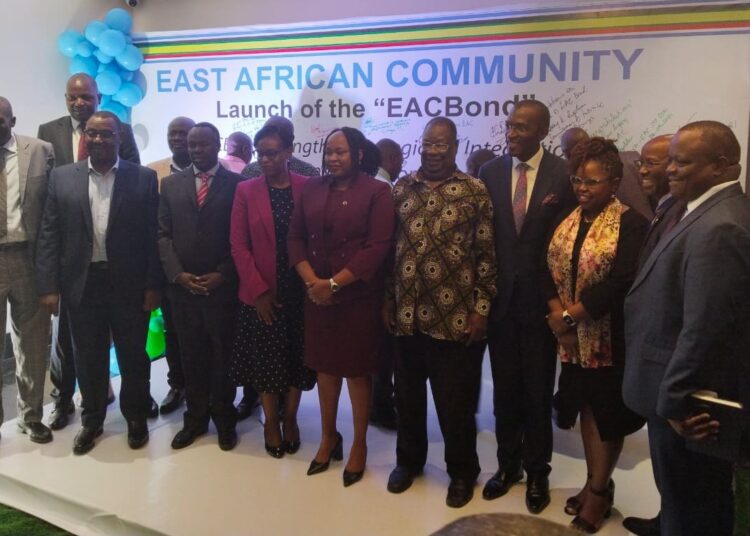Freight forwarders, led by the Federation of East African Freight Forwarders Associations (FEAFFA), have welcomed the launch of the EACBond, describing it as a transformative step that will unlock new efficiencies in regional logistics and boost business competitiveness across East Africa.
Unveiled in Kampala, Uganda, the EACBond replaces the long-standing system of multiple national customs bonds with a single, regionally recognized guarantee. This means that goods moving between Uganda, Kenya, and Rwanda—and eventually all East African Community (EAC) Partner States—can now be secured under one financial instrument. For the freight forwarding industry, this marks the removal of a persistent cost and cash flow barrier that has, for years, constrained business growth.
Speaking at the launch, FEAFFA President Charles Mwebembezi said the industry had been waiting for a competitive alternative to the RCTG for over a decade. “From today, we have a choice—one that we believe will deliver better efficiency, lower premiums, and a closer working relationship between insurers and freight forwarders,” he noted.
Mwebembezi explained that compliance levels in the region’s transit trade have steadily improved, largely due to the industry’s professionalism and significant investments by customs administrations in technology and trade facilitation. This has already led to lower insurance premiums in recent years. The EACBond, he said, offers the prospect of reducing costs even further while speeding up operational processes such as bond acquittals, minimizing paperwork, and enabling better system integration between all stakeholders.
He added that the freight forwarding industry envisions the EACBond evolving to serve continental transactions as trade under the African Continental Free Trade Area (AfCFTA) expands. He expressed optimism that this reform would also bring about a shift from a client-only relationship with insurers to a more collaborative partnership in managing and implementing the bond—similar to best practice arrangements seen internationally.
While commending the EAC Secretariat, Partner States, and development partners for their long-term commitment to developing the bond, Mwebembezi emphasized that industry engagement will be critical to its success. “We appeal for sufficient sensitization of the clearing and forwarding industry. Our forums—such as the Global Logistics Convention—provide ready-made platforms for reaching industry players directly. This engagement should be continuous, not a one-off exercise,” he urged.

The EACBond’s economic potential is significant. By replacing multiple national bonds with one regional guarantee, it is expected to release billions of dollars in previously tied-up capital back into the economy. Businesses will be able to reinvest these funds in expansion, innovation, and job creation. The EACBond is also integrated with the Regional Electronic Cargo Tracking System (RECTS), which has already reduced transit times by up to 40 percent and prevented substantial revenue losses for Partner States.
Mwebembezi reaffirmed FEAFFA’s commitment to supporting the implementation of the EACBond, stating that it is in the industry’s interest to ensure choice, efficiency, and fairness in the system. “You can count on us as partners in making this work for the benefit of the region’s businesses and economies,” he concluded.
The EACBond will be rolled out on a pilot basis in Uganda, Rwanda, and Kenya. The full rollout will progressively include all partner states, coordinated through customs authorities. According to the EAC, compliance will be enforced through automated systems linked with customs and cargo tracking, ensuring that all movements are monitored and risks are effectively managed.
The timeline for when the other five countries—Tanzania, Burundi, South Sudan, the Democratic Republic of Congo (DRC), and Somalia—will be included in the single bond system has yet to be announced.
Speaking at the launch in Kampala, EAC Secretary General Veronica Nduva highlighted how high bond requirements across individual countries have constrained business operations in the region despite its multibillion-dollar potential.
Other dignitaries present during the launch included Uganda’s Minister of State for East African Community Affairs, Hon. James Magonde Ikuya; President of the Tanzania Freight Forwarders Association (TAFFA), Mr. John Edward Urio; Chairman of the Kenya International Freight and Warehousing Association (KIFWA), Mr. Fredrick Aloo; and Chairman of the Rwanda Freight Forwarders Association (RWAFFA), Mr. David Rwigema, among others.
The article was published by Andrew Onionga, the Communications and Advocacy Officer at the Federation of East African Freight Forwarders Associations (EAFFA), and can be reached via onionga@feaffa.com / oniongaam@gmail.com Tel: +254733780240





